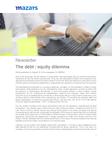
The debt / equity dilemma
Until a few years ago, the tax effects of a transaction were generated more by what the transaction claimed to be than by what it actually was. Thus, tax law rewarded formalism over substance and, although the authorities had some tools to search for the truth about the legal forms, they did not have effective tools to characterize (objectively or subjectively) the operations, revealing their true essence.
The development and growth of a company depends, ultimately, on the realization of debt or equity transactions. Debt operations can be understood to mean mutual operations carried out either with the partners or shareholders themselves, or with third parties (banks or other lenders). Equity transactions can be understood as capitalizations made by the company, either from internal accounts (such as capitalizations of reserves or other equity items) or from external resources, such as those paid by shareholders when subscribing new shares. The dividing line between debt and equity transactions is becoming increasingly thinner, and the entry into force of the International Financial Reporting Standards - IFRS - is helping to blur the line.
Our tax system includes some equity transactions that can be objectively characterized as debt transactions. The clearest case is that of the so-called "preferred shares", created by Article 33-3 of Law 1819 of 2016 to identify shares that, without being listed on the stock exchange and without incorporating the right to vote, incorporate the obligation of the issuer to repurchase them at a defined future date and to pay them a fixed dividend. Since this type of shares were used to structure debt operations, giving them the appearance of equity operations (to make them fiscally neutral for the lender), the law indicated that such shares would have, for the issuer, the same treatment as financial liabilities and for the holder, the treatment of a financial asset.
Likewise, our tax system (Tax Statute, article 260-4 paragraph 1 numeral a) also establishes some debt operations that can be objectively characterized as equity operations. This is the case, for example, of financing operations carried out with foreign related parties and whose elements such as the amount of the principal, the term, the risk rating, the guarantee, the solvency of the debtor and the interest rate are not comparable with those elements existing in operations carried out between independent parties. Such rule establishes that, if such comparability is not achieved, not only would the interest paid under such debt not be deductible, but it will be treated as a dividend since such operation is not recognized as a loan but as a capital contribution.
The operations can also be subjectively recharacterized, that is to say, without certain conditions or assumptions established in the law having to be met, but simply their essence can be varied (or unveiled) at the will of the tax officer. Thus, with the reform introduced by law 1819 of 2016 to the tax abuse rule, the tax administration, "regardless of any additional subjective intention" (...) "may Re characterize or reconfigure any operation or series of operations that constitute tax abuse (...) and disregard its effects".
In this scenario, there is a loss of certainty as to what constitutes a debt operation and an equity operation, so special care must be taken with the tax consequences of each of these operations.


